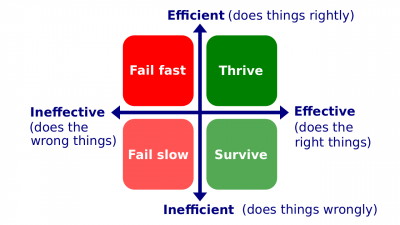Difference between revisions of "Efficiency"
(→Related lectures) |
|||
| Line 4: | Line 4: | ||
According to [[Organizational Behavior by Robbins and Judge (17th edition)]], | According to [[Organizational Behavior by Robbins and Judge (17th edition)]], | ||
:[[Efficiency]]. The degree to which an organization can achieve its ends at a low cost. | :[[Efficiency]]. The degree to which an organization can achieve its ends at a low cost. | ||
| + | According to [[Cost Accounting by Horngren, Datar, Rajan (14th edition)]], | ||
| + | [[Efficiency]]. The relative amount of inputs used to achieve a given output level. | ||
According to [[Management by Robbins and Coulter (14th edition)]], | According to [[Management by Robbins and Coulter (14th edition)]], | ||
| Line 21: | Line 23: | ||
*[[Job Search Pivots]]. | *[[Job Search Pivots]]. | ||
| − | [[Category: Management]][[Category: Economics]][[Category: Septem Artes Administrativi]][[Category: CNM Cyber Orientation]][[Category: Articles]] | + | [[Category: Management]][[Category: Economics]][[Category: Septem Artes Administrativi]][[Category: CNM Cyber Orientation]][[Category: Articles]][[Category: Accounting]] |
Revision as of 12:31, 10 July 2020
Efficiency is the degree to which an enterprise gets the most outputs from the least amount of inputs.
Definitions
According to Organizational Behavior by Robbins and Judge (17th edition),
- Efficiency. The degree to which an organization can achieve its ends at a low cost.
According to Cost Accounting by Horngren, Datar, Rajan (14th edition), Efficiency. The relative amount of inputs used to achieve a given output level.
According to Management by Robbins and Coulter (14th edition),
- Efficiency. Doing things right, or getting the most output from the least amount of inputs.
According to Principles of Economics by Timothy Taylor (3rd edition),
- Efficiency. When it is impossible to get more of something without experiencing a trade-off of less of something else.
Related concepts
- Performance. The end result of an activity.
- Effectiveness. The degree to which an enterprise does those activities that result in achieving its goals. In other words, effectiveness is the measure of how an enterprise meets the needs of its clientele or customers.
Efficiency is doing things right; effectiveness is doing the right things. -- Peter Drucker, management consultant
